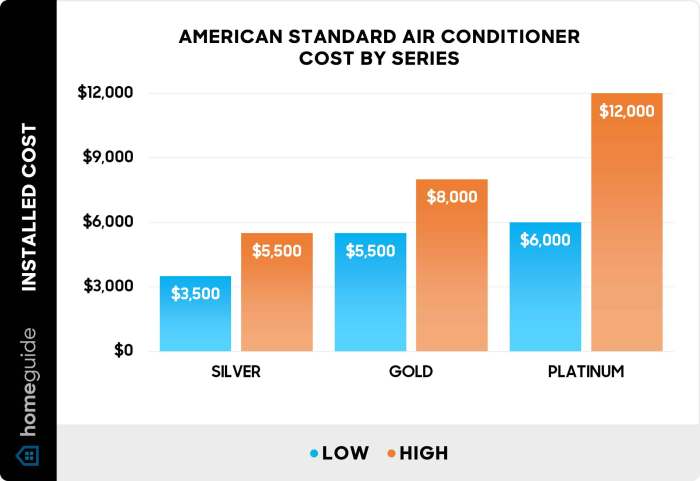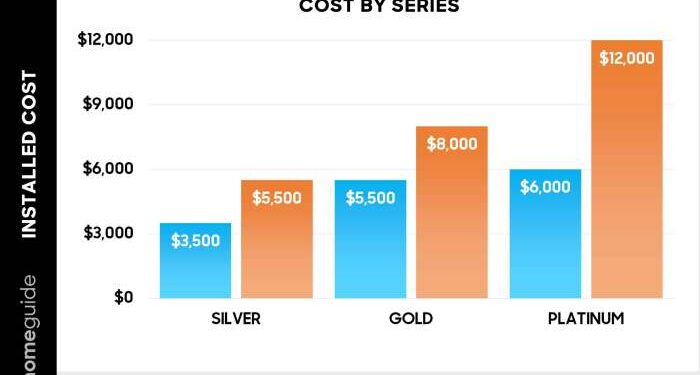Exploring the realm of The Average Cost of Air Conditioner Replacement in 2025, this introduction invites readers with a blend of expertise and intrigue, offering a compelling narrative that is both informative and engaging.
Delve into the subsequent paragraph for a thorough examination of the topic at hand.
Factors Affecting the Cost of Air Conditioner Replacement
When considering the cost of replacing an air conditioner, there are several key factors that can significantly impact the overall price. These factors include the location of the installation, the type of unit being replaced, and the labor costs involved.
Location
The geographical location plays a crucial role in determining the cost of air conditioner replacement. Urban areas with higher living costs and demand for skilled labor may have higher installation costs compared to rural areas. Additionally, regions with extreme weather conditions may require specialized units, increasing the overall cost.
Type of Unit
The type and size of the air conditioner being replaced can also influence the cost. Larger units or those with advanced features such as energy-efficient technology or smart capabilities may come at a higher price point. Additionally, the brand and quality of the unit can impact the overall cost of replacement.
Labor Costs
Labor costs for installing a new air conditioner can vary based on the complexity of the installation, the experience of the technicians, and any additional services required. Hiring licensed professionals or specialized technicians may come at a higher cost but ensure proper installation and optimal performance of the new unit.
Trends in Air Conditioner Technology and Pricing
Air conditioner technology is constantly evolving, leading to changes in pricing and energy efficiency. As we look towards 2025, it's essential to understand the latest trends shaping the industry.
Advancements in Energy Efficiency
With a growing focus on sustainability and energy conservation, manufacturers are investing heavily in developing more energy-efficient air conditioning units. These advancements not only benefit the environment but also help homeowners save on their energy bills in the long run.
Energy-efficient models may come at a higher initial cost, but the potential savings over time make them a worthwhile investment.
Smart Technology Integration
Smart technology integration is becoming increasingly popular in the HVAC industry. In 2025, we can expect to see more air conditioners equipped with smart features such as Wi-Fi connectivity, mobile app control, and automation capabilities. While these advanced technologies offer convenience and enhanced user experience, they can also impact the pricing of air conditioner units.
Smart-enabled models may come at a premium cost compared to traditional units, reflecting the added value and convenience they provide to consumers.
Cost Comparison

In comparing the average cost of air conditioner replacement between 2020 and 2025, it is essential to consider various factors that may influence the price changes within this time frame.
Projected Cost Increase by 2025
In 2020, the average cost of air conditioner replacement ranged from $3,000 to $7,000, depending on the size, brand, and efficiency of the unit. However, by 2025, it is projected that these costs may increase by approximately 10% to 20%.
This means that consumers can expect to pay between $3,300 to $8,400 for a new air conditioner installation.
Reasons for Cost Increase
Several factors contribute to the projected increase in replacement costs by 2025. One significant factor is the rising prices of raw materials, such as copper and aluminum, which are essential components of air conditioning systems. Additionally, advancements in technology and energy-efficient features may also lead to higher upfront costs for newer models.
Expected Price Difference
Based on current trends and market analysis, the expected price difference between 2020 and 2025 for air conditioner replacement can be estimated at around $300 to $1,400, depending on the specific requirements of the installation.
Environmental Regulations and Cost Impact
Environmental regulations play a significant role in shaping the cost of air conditioner replacement. As governments worldwide focus on reducing carbon emissions and promoting energy efficiency, the HVAC industry faces evolving standards that can impact prices for consumers.
Refrigerant Phase-Out Regulations
The phase-out of refrigerants like R-22 and R-410A due to their high global warming potential has been a major regulatory change affecting the HVAC industry. The transition to more environmentally friendly alternatives can lead to higher costs for air conditioner replacement as manufacturers invest in new technologies and production processes.
Energy Efficiency Standards
Stringent energy efficiency standards imposed by governments aim to reduce electricity consumption and promote sustainable cooling solutions. While energy-efficient air conditioners can help consumers save on utility bills in the long run, they may come at a higher initial cost due to advanced features and materials required for compliance.
Eco-Labeling Requirements
Eco-labeling programs that certify air conditioners based on their environmental impact and energy efficiency are becoming more prevalent. Consumers are increasingly inclined to choose eco-labeled products, which may influence pricing strategies in the HVAC market. Manufacturers may invest in eco-friendly technologies to meet these requirements, potentially increasing the cost of air conditioner replacement.
Extended Producer Responsibility
Extended producer responsibility (EPR) regulations hold manufacturers accountable for managing their products throughout their lifecycle, including recycling and disposal. Compliance with EPR requirements can add to the overall cost of air conditioner replacement as manufacturers incorporate recycling and sustainability measures into their production processes.
Last Point
As we wrap up our discussion on The Average Cost of Air Conditioner Replacement in 2025, we leave you with a thought-provoking summary that encapsulates the essence of our exploration.
FAQ Summary
What are the key factors influencing the cost of air conditioner replacement?
The key factors include location, type of unit, and labor costs, all of which can significantly impact the overall price.
How do advancements in air conditioner technology affect replacement costs?
Technological advancements, especially in energy efficiency and smart technology integration, may influence the initial investment for a new unit.
What is the expected price difference between air conditioner replacement costs in 2020 and 2025?
While actual figures may vary, projections suggest a noticeable change in costs due to various factors at play.
How can changing environmental regulations impact the cost of air conditioner replacement?
Environmental regulations can lead to fluctuations in prices as manufacturers adapt to meet eco-friendly requirements, potentially affecting long-term costs for consumers.





![How To Avoid Contractor Scams [Infographic]](https://airconditioner.infotangerang.id/wp-content/uploads/2025/10/how-to-avoid-contractor-scams-feat-120x86.png)








